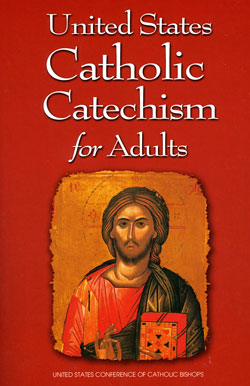Religious Education Supplement
Certification process will help catechists, teachers know the faith better

The United States Catholic Catechism for Adults (USCCA) was released by the U.S. Conference of Catholic Bishops in 2006. The Archdiocese of Indianapolis’ Office of Catholic Education is using the USCCA as the centerpiece for the doctrinal component of the basic certification process for all catechists, school teachers, youth ministers, parish administrators of religious education and principals.
By Sean Gallagher
In her many years of catechetical ministry, Nancy Fehringer has seen many new resource materials come across her desk. Many end up gathering dust on her bookshelf.
But when the resource and program administrator for the Batesville Deanery saw the United States Catechism for Adults (USCCA) for the first time soon after it was released in 2006, she knew that something special was in her hands.
Fehringer and the parish administrators of religious education in the deanery studied the adult catechism during monthly meetings over the course of two years.
“It was really a wonderful experience,” she said. “It helps you to formulate the thoughts in your mind about something that you do know, but maybe you didn’t have the words to share it with others. I think it’s wonderful just for the new evangelization and the Year of Faith.”
Starting this fall, all catechists, school teachers, youth ministers, parish administrators of religious education and principals will study the USCCA as the doctrinal component of the basic certification program for people involved in ministries overseen by the archdiocese’s Office of Catholic Education.
They will study the USCCA over the course of two years, turning in brief reflections on a quarterly basis on what they have read.
“I’m just thrilled,” said Fehringer of the new certification program. “I think it’s wonderful, first, that there is a standard for us to meet and, second, that it’s been presented in this way. [The USCCA] is an excellent tool. And the fact that this is our standard brings us all up into a higher level of learning the faith and to be able to articulate the faith well.”
Ken Ogorek, archdiocesan director of catechesis, has helped implement the certification process, which also involves basic training specific to individual ministry fields.
He said that the process has the potential to improve the ministry of everyone in the archdiocese who seeks to form the faith of people of all ages.
“Every catechist needs a deep well to draw from,” Ogorek said. “When you’re teaching the faith, you never know what’s going to come up. You never know what question a person is going to have. So you need a deep well.
“This effort is a practical way for people to replenish and deepen their well on a regular ongoing basis so that when that opportunity arises you can seize it by God’s grace and use it for his glory.”
The reflections are turned in and reviewed by the immediate supervisors of those involved in the certification process. So parish administrators of religious education will read the reflections of their catechists and principals will read the reflections of their teachers.
Peggy Elson, principal of Immaculate Heart of Mary School in Indianapolis, did this in the 2011-12 academic year since her school had been chosen to participate in a pilot program of the process.
“As a reader of their reflections, I’m wowed in reading just a few sentences by the impact that the book has had on the teachers,” Elson said. “Learning this should impact how you teach in the next week.”
Ogorek echoed Elson’s hopes, saying that the schedule of the readings from the USCCA for the certification process has been formulated to correspond as well as possible to the order in which various subjects are taught in religion classes in schools and catechetical programs.
“I’m looking forward to seeing our administrators continue to grow in their own knowledge of the faith,” Ogorek said, “and in their confidence in witnessing to the power and beauty of our faith.”
Both Elson and Fehringer said studying the USCCA as a group has many benefits and, in their opinion, is superior to studying it individually.
“There’s something about the shared experience of you and I reading the same thing,” Elson said. “When we’re reading the same thing and you see something in it that I don’t see, I begin to look at you and think, ‘What great insights you have.’ It opens our eyes to the expertise of the people in the room.”
Ogorek agreed that there are advantages to a group study, but that he was hesitant to require such a format.
“We can’t micromanage that,” he said. “Every program is a little bit different.”
In addition to the two-year study of the USCCA, catechists, teachers, youth ministers, parish administrators of religious education and principals will also be required to renew their certification every three years.
This will happen by reading books, watching videos, exploring more deeply areas of personal interest, going on a retreat or day of reflection or studying methodologies.
A list of approved options available in the renewal process will be supplied to all involved in it. Ogorek said that the list is open to expansion.
“We want to give people lots of options in both content and format,” he said. “So we will start with a list of approved resources and experiences. And there will be a mechanism to propose additions to that list.”
Ogorek said that the certification and renewal processes ultimately involve faith formation activities that all adult Catholics should make their own.
“Catechists need to be people of faith who are constantly learning and growing in their faith,” Ogorek said. “So what we’re asking people to do are simply those things that adult Catholics ought to do anyway. We’re just asking people to be more mindful of it.” †
